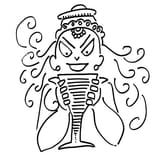Search Results
6/21/2025, 6:01:31 AM
>>17780078
>>17780186
>>17780195
>>17780227
People who speak of Muhl Oral Tradition forget that the Indo-Aryans themselves lived in the midst of intense theological, political and territorial conflicts, which are directly reflected in the scriptures themselves. The Vedas are not a unified body of eternal wisdom carefully transmitted without alteration, but rather a chaotic, contradictory product disputed by different Aryan groups over the centuries. The same goes for the Gathas.
A clear example of this is the internal contradictions of the Rigveda. In it, we see different hymns exalting gods who, in other sections, are demoted, ignored or even symbolically opposed by other gods or rival sects. Indra, for example, is glorified as the slayer of Vritra, but other hymns portray him as a drunken, unstable and morally ambiguous god.
One of the most repeated themes in the Rigveda is that Indra drinks immense quantities of soma, the intoxicating ritual nectar, before performing his heroic deeds. But this is not just a poetic metaphor, he literally gets drunk:
>“In drunken madness Indra once swallowed the Soma... drunk, he struck down his foes... drunk, he thought himself greater than the heavens.” - Rigveda 10.119.1–6
>"When I was drunk, I cared not for the gods... I took the sky and placed it in the balance." - RigVeda 10.119.4
That is, he gets drunk, despises the other gods, has delusions of grandeur and acts arrogantly. In addition to his drunkenness, Indra is sometimes described as violent and uncontrollable, even against allies or humans:
>"Like a wild bull, Indra rushes forth… he slays his own priest, he slays the sacrificer." - RigVeda 4.18.3
This verse suggests that not even the Aryan devotees are safe from his fury.
>>17780186
>>17780195
>>17780227
People who speak of Muhl Oral Tradition forget that the Indo-Aryans themselves lived in the midst of intense theological, political and territorial conflicts, which are directly reflected in the scriptures themselves. The Vedas are not a unified body of eternal wisdom carefully transmitted without alteration, but rather a chaotic, contradictory product disputed by different Aryan groups over the centuries. The same goes for the Gathas.
A clear example of this is the internal contradictions of the Rigveda. In it, we see different hymns exalting gods who, in other sections, are demoted, ignored or even symbolically opposed by other gods or rival sects. Indra, for example, is glorified as the slayer of Vritra, but other hymns portray him as a drunken, unstable and morally ambiguous god.
One of the most repeated themes in the Rigveda is that Indra drinks immense quantities of soma, the intoxicating ritual nectar, before performing his heroic deeds. But this is not just a poetic metaphor, he literally gets drunk:
>“In drunken madness Indra once swallowed the Soma... drunk, he struck down his foes... drunk, he thought himself greater than the heavens.” - Rigveda 10.119.1–6
>"When I was drunk, I cared not for the gods... I took the sky and placed it in the balance." - RigVeda 10.119.4
That is, he gets drunk, despises the other gods, has delusions of grandeur and acts arrogantly. In addition to his drunkenness, Indra is sometimes described as violent and uncontrollable, even against allies or humans:
>"Like a wild bull, Indra rushes forth… he slays his own priest, he slays the sacrificer." - RigVeda 4.18.3
This verse suggests that not even the Aryan devotees are safe from his fury.
Page 1
